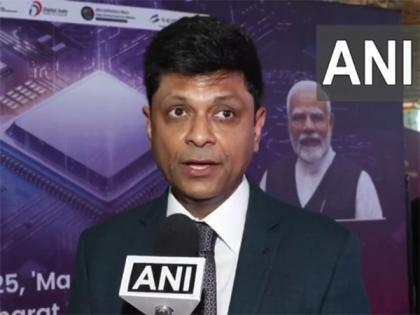India needs more fabless semiconductor companies to drive ecosystem growth: Axiro Semiconductor CEO Naveen Yanduru
By ANI | Updated: September 4, 2025 11:55 IST2025-09-04T11:52:04+5:302025-09-04T11:55:16+5:30
New Delhi [India], September 4 : India's semiconductor ambitions will gain real momentum only when the country nurtures strong ...

India needs more fabless semiconductor companies to drive ecosystem growth: Axiro Semiconductor CEO Naveen Yanduru
New Delhi [India], September 4 : India's semiconductor ambitions will gain real momentum only when the country nurtures strong fabless chip companies that can bring innovation to the market, said Naveen Yanduru, Chief Executive Officer (ECO) of Axiro Semiconductor, a part of a subsidiary of CG Power and Industrial Solutions Ltd. (Murugappa Group).
He noted that while India has made progress with OSATs and foundries, the next step must be building more fabless firms.
Speaking toon the sidelines of Semicon India 2025, Yanduru said, "The next innings has to be about fabless semiconductor companies for India, and that's where I think the big momentum will come for making the semiconductor economy in India a big one."
A fabless semiconductor company focuses on designing and innovating chips but outsources their manufacturing, while an OSAT (Outsourced Semiconductor Assembly and Test) company handles the back-end work of packaging, assembling, and testing those chips after fabrication.
In short, fabless firms create the "brains" of the chip, whereas OSATs ensure the chip is reliable, usable, and ready for integration into end products. They complement each other in the semiconductor supply chain.
"The big thing about fabless semiconductor companies is innovation," Yanduru said.
"Fabless semiconductor companies demand a big percentage of the semiconductor economy, as well as the margins that they get, and the big household names that you know of when you talk about the semiconductor industry, whether it's NVIDIA, Qualcomm, Broadcom, or AMD. These are all fabless semiconductor companies. The big thing that you need is innovation," he added.
However, he pointed out that the Indian ecosystem still lacks the customer access and testing capabilities needed for success.
"What we are lacking is lack of experience and lack of having the ecosystem around it. So, how are a lot of these companies successful? Because they work very closely with the customers," he said, stressing that chipmakers in India face difficulty in directly interacting with customers since most buyers are overseas.
For chip companies to succeed, he emphasised the need for more local Original Design Manufacturers (ODMs) and module companies. "More ODMs and OEMs (Original Equipment Manufacturers) have to show up in the Indian market so the chip companies can directly work with them and not have to rely on customers outside of India," Yanduru said.
On the debate over whether Indian players should target the automotive and defence sectors over high-end computers, Yanduru said each market presents unique challenges.
"Every chip and every market has its challenges. And when you win and when you get a significant market share in any of these markets, then you have arrived and then you can slowly graduate and go to other markets," he explained.
On government support, Yanduru welcomed incentive schemes but stressed that funds must be linked to tangible output.
"As far as the incentives that the government is rolling out, I think the intent is very good, especially on the manufacturing side, they have done a very good job... That's why I'm a very big fan of this PDLI or whatever, production design initiative for companies like Axiro or anybody else."
In just four years, since the launch of the India Semiconductor Mission (ISM) in 2021, India has transformed its semiconductor journey from vision to reality. To support this vision, the government announced a Rs 76,000 crore Production Linked Incentive (PLI) scheme, of which nearly Rs 65,000 crore has already been committed.
Additionally, on August 28, a major milestone in India's semiconductor journey was achieved with the launch of one of the country's first end-to-end Outsourced Semiconductor Assembly and Test (OSAT) Pilot Line Facilities in Sanand, Gujarat. Semiconductor company CG-Semi is expected to roll out the first 'Made in India' chip from this pilot facility.
Disclaimer: This post has been auto-published from an agency feed without any modifications to the text and has not been reviewed by an editor
Open in app